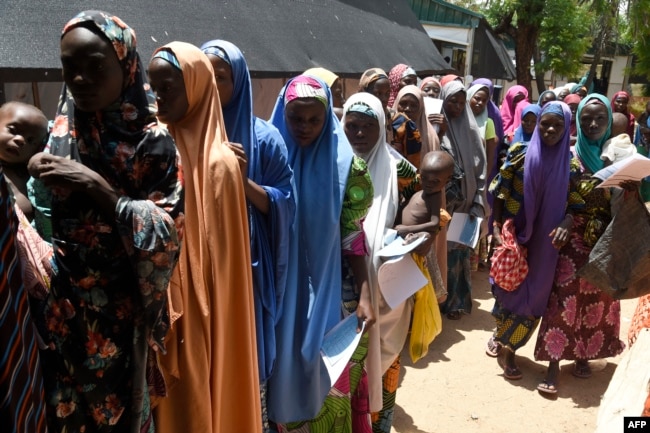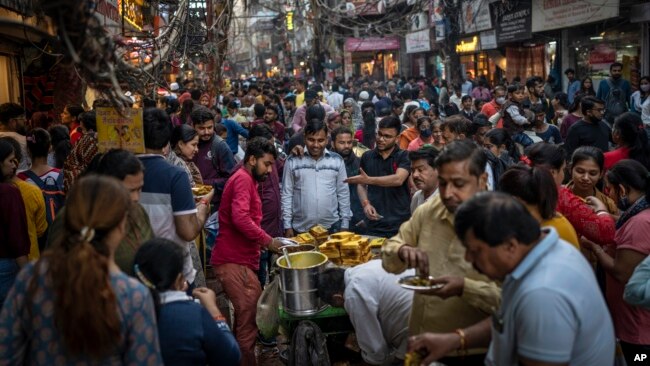80億人を突破した世界人口
アフリカ、アジアの人口増加が顕著です。
そして、気候変動による環境破壊、食糧不足。
しかしそれらは先進国のツケを払わされている現状が指摘されます。
VOAで英語を学びましょう!!
80億人を突破した世界人口と課題(和訳)
World Population Hits 8 Billion, Creating Many Challenges
Vov.16,2022
国連の報告書によると、火曜日、世界の人口は推定80億人に達しました。この増加の多くはアフリカの発展途上国からもたらされています。
国連が発表した火曜日の80億人の日は、正確というより代表的なものである、と関係者は指摘します。
この報告書はこの夏に発表され、他の予測も含まれていました。この報告書では、世界の人口は2030年に約85億人、2050年に約97億人、2100年に約104億人に達すると予測しています。
その中で、サハラ以南のアフリカの多くの国では、2022年から2050年にかけて人口が倍増すると予測されていることがわかっています。このような人口増加は、"すでに疲弊している資源にさらなる圧力をかけ、貧困や不平等を減らすことを目的とした政策に挑戦することになる "と報告書は述べています。
ナイジェリアでは、資源はすでに限界まで到達しています。ナイジェリア最大の都市ラゴスでは、1,500万人以上の人々が、自宅を照らす電気から満員のバスの座席に至るまで、あらゆるものをめぐって競争しています。
国連によると、今後30年間でナイジェリアの人口は2億1,600万人から3億7,500万人に増加すると予想されています。これはインド、中国、米国に次いで世界で4番目に人口の多い国になります。
「すべてが手いっぱいですー住宅、道路、病院、学校。すべてが手狭になっています」とギャン・ダヨプ氏は言います。彼はナイジェリアで都市計画や開発のアドバイスをしています。
人口の増加は、発展途上国にさらに多くの人々を置き去りにする恐れがあります。政府は、急増する若者に十分な教室と仕事を提供するのに苦労することでしょう。また、食糧不安はより深刻な問題となるでしょう。
ナイジェリアは、国連が現在から2050年までの間に世界の人口増加の半分以上を占めると発表した8カ国のうちのひとつです。この8カ国には、コンゴ、エチオピア、タンザニアも含まれています。
その他、エジプト、パキスタン、フィリピン、インドが最も急速に人口が増加している国です。インドは来年、中国を抜いて世界で最も人口の多い国になると言います。
急速な人口増加は、気候変動が作物生産にますます影響を及ぼす中、水資源や食料を奪い合う人々が増えることも意味します。
「環境に対する圧力も大きくなり、気候変動の影響も加わって、食糧安全保障に対する課題が増加しています」とスリナス・レディ博士は述べています。彼はインド公衆衛生財団(Public Health Foundation of India)の会長です。
しかし、専門家によれば、環境に対するより大きな脅威は消費であり、これは人口がそれほど増加していない先進国で最も高くなっています。消費とは、燃料など何かを使用することを意味します。
プーナム・ムットレジャ氏は、インド人口基金(Population Foundation of India)のエグゼクティブディレクターです。彼女は、「過去25年間で、世界の人口のうち最も裕福な10パーセントが、全炭素排出量の半分以上を占めています 」と述べています。
成長するアフリカ
国連によると、サハラ以南のアフリカの人口は毎年2.5%の割合で増加しています。これは世界平均の3倍以上です。サハラ以南のアフリカの女性の平均出産回数は4.6回。これは現在の世界平均の2.3の2倍です。
国連は、今、家族の人数を減らす努力をしたとしても、2050年の成長予測を効果的に遅らせるには遅すぎると述べています。
世界の他の地域でも成長が鈍化
国連は、一部の国で人口が増加しても、61カ国で1%以上の割合で減少すると予測しています。
米国国勢調査局のデータによると、米国の人口は現在約3億3,300万人。2021年の人口増加率はわずか0.1%で、建国以来最低となりました。
ウィリアム・フレイ氏は、「今後は、成長が緩やかになります。問題は、どの程度緩やかになるかです」と語ります。彼はブルッキングス研究所の人口変化の専門家です。「米国や他の多くの先進国にとって、本当のワイルドカードは移民です。」
消費について
チャールズ・ケニー氏はワシントンのグローバル開発センターのシニア・エキスパートです。彼は、80億人という推計をめぐる環境問題は、特に先進国での消費に注意を向けるべきであると述べています。
彼は、「人口が問題なのではありません、消費の仕方が問題なのです 」と言います。
World Population Hits 8 Billion, Creating Many Challenges
A United Nations report projects the world’s population hit an estimated 8 billion people on Tuesday. Much of the growth comes from developing nations in Africa.
The U.N.’s Day of 8 Billion on Tuesday is more representative than exact, officials note.
The report was released this summer and included other predictions, as well. It projected the world’s population will reach around 8.5 billion in 2030, 9.7 billion in 2050, and 10.4 billion in 2100.
The report found that the population in many countries in sub-Saharan Africa is predicted to double between 2022 and 2050. Such a population increase, the report said, will put “additional pressure on already strained resources and challenging polices aimed at reducing poverty and inequalities.”
In Nigeria, resources are already stretched to the limit. More than 15 million people in the country’s biggest city, Lagos, compete for everything from electricity to light their homes to seats on crowded buses.
The U.N. says that over the next 30 years, Nigeria’s population is expected to increase from 216 million to 375 million. That would make Nigeria the fourth-most populous country in the world after India, China, and the United States.
“We are already overstretching what we have — the housing, roads, the hospitals, schools. Everything is overstretched,” said Gyang Dalyop. He advises in city planning and development in Nigeria.
Increasing populations threaten to leave behind even more people in developing countries. Governments will struggle to provide enough classrooms and jobs for a quickly growing number of young people. And food insecurities will become an even more urgent problem.
Nigeria is among eight countries the U.N. says will account for more than half the world’s population growth between now and 2050. Other African countries included in that group are Congo, Ethiopia and Tanzania.
The other countries with the fastest growing populations are Egypt, Pakistan, the Philippines and India. India is set to overtake China as the world’s most populous nation
next year.
Fast population growth also means more people competing for water resources and food, as climate change increasingly affects crop production.
“There is also a greater pressure on the environment, increasing the challenges to food security that is also compounded by climate change,” said Dr. Srinath Reddy. He is president of the Public Health Foundation of India.
Still, experts say the bigger threat to the environment is consumption, which is highest in developed countries not undergoing big population increases. Consumption means the use of something, such as fuel.
Poonam Muttreja is executive director of the Population Foundation of India. She said, “Over the past 25 years, the richest 10 percent of the global population has been responsible for more than half of all carbon emissions.”
Growing Africa
The U.N. says the population in sub-Saharan Africa is growing at a rate of 2.5 percent each year. That is more than three times the world average. Women in sub-Saharan Africa on average have 4.6 births. That is two times the current world average of 2.3.
The U.N. said that any effort to reduce family size now would come too late to effectively slow the 2050 growth projections.
Slowing growth in other parts of the world
Even as populations increase in some countries, the U.N. says rates are expected to drop by one percent or more in 61 nations.
The U.S. population is now around 333 million, according to data from the U.S. Census Bureau. The population growth rate in 2021 was just 0.1 percent, the lowest since the country was founded.
“Going forward, we’re going to have slower growth — the question is, how slow?” said William Frey. He is an expert in human population changes at the Brookings Institution. “The real wild card for the U.S. and many other developed countries is immigration.”
Consumption
Charles Kenny is a senior expert at the Center for Global Development in Washington. He said environmental concerns surrounding the 8 billion estimate should bring attention to consumption, especially in developed countries.
He said, “Population is not the problem, the way we consume is the problem.”
Words in This Story
strained – adj. feeling or showing the effect of too much work, use, or effort
challenge – v. to test the ability, skill, or strength of (someone or something
poverty – n. the state of being poor
consumption – n. the amount of something that someone uses, eats or drinks
global – adj. involving the entire world
emissions – n. the act of producing or sending out something (such as energy or gas) from a source
wild card – n. a person or thing that could affect a situation in a way that cannot be predicted: an unknown or unpredictable factor

